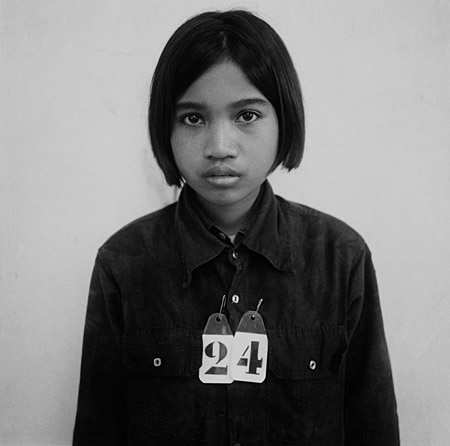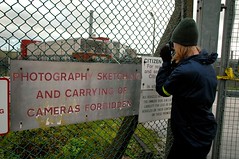Camera Guy - Full Text
2007 was an interesting year for newspapers. And I mean interesting like this: Imagine you're parachuting into an orchard of spears. That's how the future of newspaper journalism sometimes looks to those of us drifting slowly down, trapped in gravity's pull.
A few months ago, a longtime friend called to say farewell. He said I probably wouldn't see him again. He had developed a time machine and was going to return himself to 1989, a simpler year when he was much happier. (Fact: there are no time machines.)
This friend is a photographer who worked at a small daily newspaper in a small town. If you've ever worked on a small paper, you know how it is: several assignments per day and everyone in town knows you're the "Camera Guy."
My friend served as Camera Guy for over a decade. It's what he always wanted to do. It's what he loved. But one day the word "multimedia" blew into town and was heralded as the future and savior of his newspaper. After that, going to work became something to be nervous about. With photo-graph-video-tography pushed on him, he was facing the task of mastering a new medium and learning complex software without any training.
He quit.
And you know what? I find it hard to blame him. In fact, I give him a lot of credit for stepping away. If his heart wasn't in it, better to leave than to slog along half-heartedly at something he didn't believe in. Newspapers are in desperate need of believers and dreamers right now, people with passion for storytelling and loads of creative energy. Without them newspaper readers will drift away to more interesting sites. (ratemycorpsepaint.com, for example.) If you're not up for the fight we face, you'll be happier elsewhere. No shame in that.
I think what my friend saw in the future of his newspaper was a shift from quality to quantity. I think he was concerned about doing quick, shallow multimedia pieces. And that spending his time on labor-intensive multimedia would limit the time he could spend making great in-depth photographs of his community.
It could be said that many newspaper photographers are wanna-be artists. I'll gladly put myself in that category, even if you won't. Working at a newspaper provides me with equipment, an audience, and a never-ending stream of assignments to visually riff on. Not every assignment provides the best canvas for my artistic attempts, but there is always another one coming up in a couple hours that might expose me to a beautiful moment or story.
I guess the question my friend had to ask himself was related to that. Is the newspaper of the future a place where he could satisfy his passion for creating something beautiful? Or would it become a lifeless production centre, filled with 24-7 deadlines and weekly multimedia quotas?
With everything up in the air, who knows? Every newspaper seems to be scrambling for the answers and reaching wildly differing conclusions. I've got no answers for you and your particular situation, other than to say that you need to find your own answer.
Back to the time machine. Why is my friend going back to 1989, you ask? It isn't for the hair metal. It was a great year for photojournalism. Nikon released their flagship pro SLR, the F4. The Canon F-1 was still seeing action on the frontlines. Kodak's new T-Max 3200 black and white film let you see in the dark. The first Eddie Adams workshop was held.
It was a different time then. Better and worse than today. In 1989 I attended a photojournalism conference in San Jose where the topic was the future of newspapers People were saying that people would one day read the newspaper on the TV set. They were showing their prototypes for the newspaper of the future. I remember one front page was simply a list of ten headlines, nothing more.
Nineteen years later, the printed edition of the paper still slams hard into my front door every morning. I'll leave the predictions on its future to Dr. Robotnik and his ten-headline front page.
Labels: multimedia, photojournalism
| Share this post : |




















